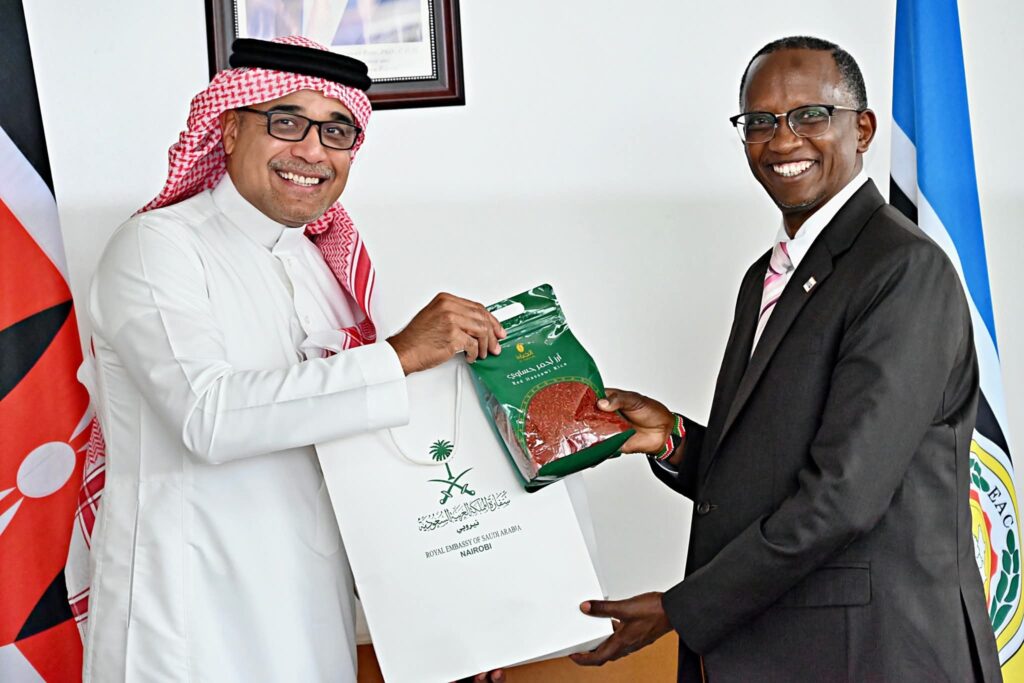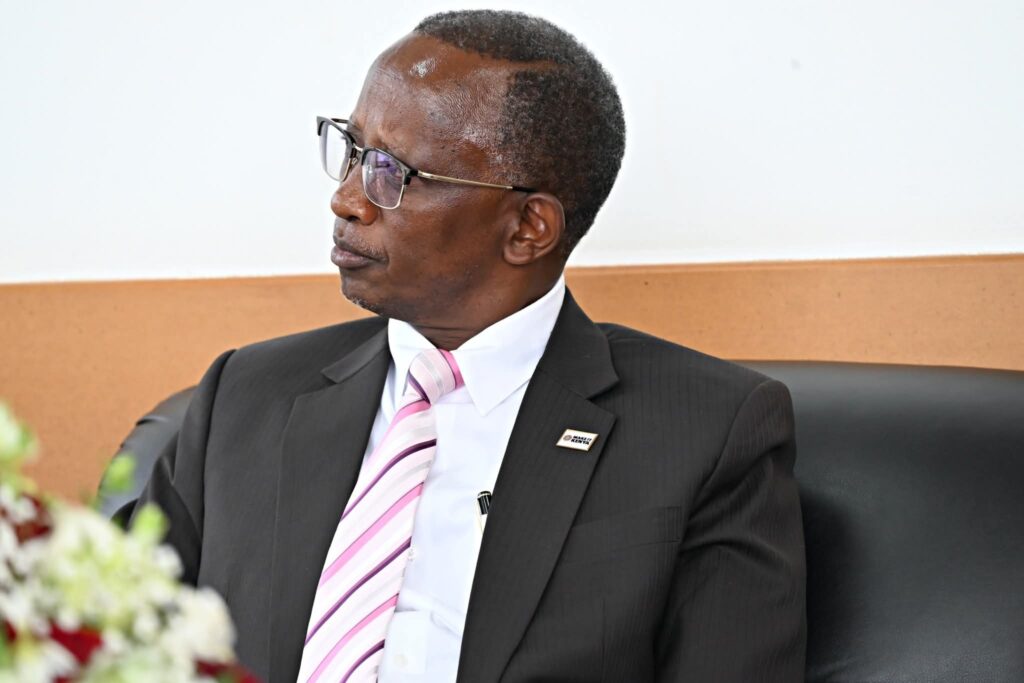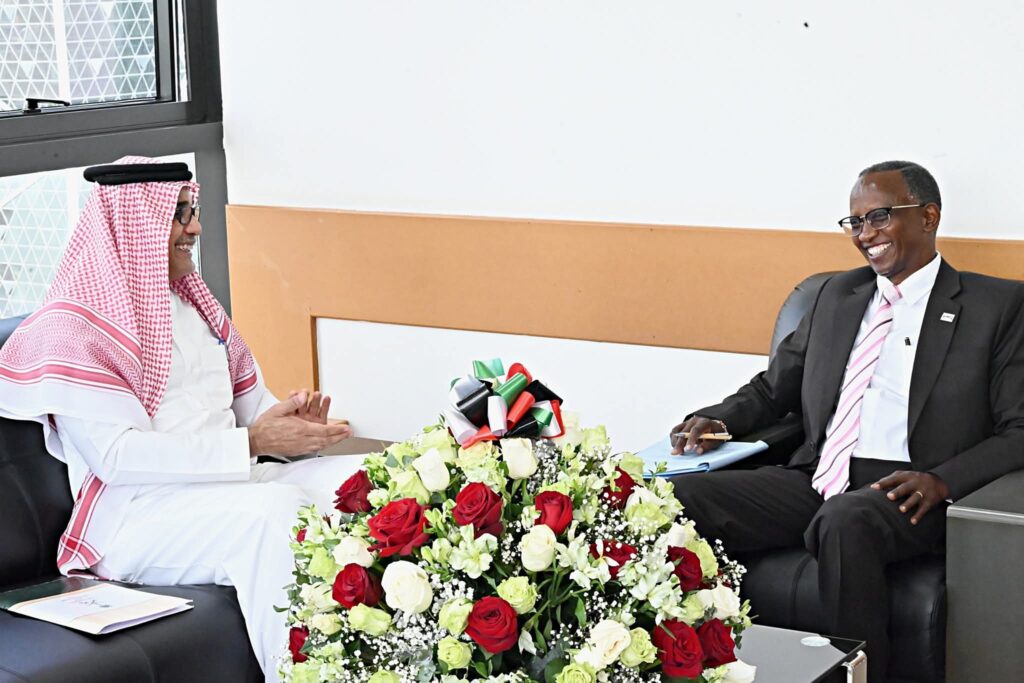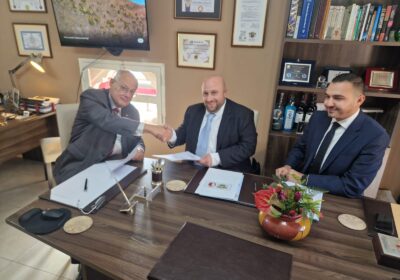Saudi Arabia, Kenya Deepen Ties, Tackle Misinformation on Migration Relations.
By Raymond Enoch
The Saudi Arabian Ambassador to Kenya, H.E. Khalid Salman Al-Salman, has pledged closer cooperation with Kenya’s newly appointed Deputy Director General for Middle East Affairs, Amb. Lindsay Kiptiness, as both sides move to strengthen labour and diplomatic relations and jointly counter what they describe as misleading narratives about Kenyan migrants in the Kingdom.

Amb. Al-Salman paid a courtesy call on Amb. Kiptiness yesterday at the Ministry of Foreign and Diaspora Affairs (MFDA) in Nairobi, in one of the first high-profile engagements since Kiptiness assumed his new role at the Middle East Affairs Directorate. Their deliberations focused on deepening areas of mutual interest, particularly labour, consular cooperation and broader bilateral ties between Kenya and Saudi Arabia. Both officials praised the cordial and longstanding relationship between the two countries and agreed that there was significant room to elevate it further.

The Saudi envoy congratulated Amb. Kiptiness on his appointment and declared his readiness to work closely with him to advance the partnership. He underscored the importance of the Kenyan workforce in Saudi Arabia, noting that the Kingdom currently hosts about 300,000 Kenyan workers, many of whom have lived and worked there for over a decade and continue to contribute meaningfully to Saudi Arabia’s development across various sectors.

In response, Amb. Kiptiness expressed Kenya’s appreciation to the Government and people of Saudi Arabia for accommodating such a large Kenyan community and reaffirmed Nairobi’s commitment to strengthening ties with Riyadh. He reiterated that protecting the welfare and rights of Kenyans abroad remains a key priority for the Ministry of Foreign and Diaspora Affairs and5 assured the Saudi side of Kenya’s readiness to further consolidate cooperation under existing bilateral frameworks.
A significant portion of the discussions was devoted to recent international and local claims suggesting that Kenyan mothers and their toddlers were stranded on the streets of Riyadh without food or shelter, allegedly neglected by their government. The reports, carried in the New York Times and echoed in a tweet attributed to the Senator for Kiambu County, were firmly rejected by both the Saudi envoy and the Kenyan official, who described the accounts as inaccurate and potentially damaging to the relations of the two friendly nations.

They stressed that Saudi law does not permit individuals to live or beg on the streets. Instead, the government operates safe houses, known as “Sakan”, where distressed individuals are accommodated free of charge pending repatriation. Amb. Al-Salman noted that, given the strict enforcement of public order laws, any such mothers and children would have been swiftly taken off the streets and placed in shelters. He further explained that children born in hospitals in Saudi Arabia receive birth certificates, while those born outside the formal health system may not immediately obtain documentation, but that there are established, humane procedures for dealing with undocumented persons and illegal immigrants, including deportation under bilateral arrangements.
During the meeting, it was confirmed that 73 children and 59 Kenyan mothers had recently been repatriated to Kenya through an existing bilateral mechanism. This, the officials argued, was clear evidence that the two governments were actively collaborating to resolve cases involving distressed Kenyan nationals rather than abandoning them. The two sides also highlighted an ongoing challenge: hundreds of Kenyan children’s birth certificates remain uncollected at the Kenya Embassy in Riyadh, despite repeated appeals through various channels, including Diaspora association officials, urging parents to claim the documents.
Confirmation from the Embassy in Riyadh indicated that some of the single mothers alleged to be on the streets were not interested in returning home, hoping instead to secure employment in Saudi Arabia while sending their children back to Kenya. This nuance, Kenyan and Saudi officials insisted, is often omitted in sensationalised narratives that portray the migrants as abandoned or ignored by both governments.
Amb. Al-Salman and Amb. Kiptiness jointly called on the New York Times and other individuals or entities making similar claims to be objective in their reporting, warning that unverified or distorted stories risk undermining relations between two friendly nations and misrepresenting ongoing consular efforts. They reiterated that Kenya and Saudi Arabia maintain structured channels to handle cases involving Kenyan nationals in distress and that these mechanisms are being used actively, as evidenced by recent repatriations and sustained diplomatic engagement.
Their position echoed remarks by the Prime Cabinet Secretary and Cabinet Secretary for Foreign and Diaspora Affairs during his most recent media briefing, where he emphasized that the Government of Kenya does not and has never neglected its citizens when they require emergency or3 other support abroad. He urged leaders at all levels to exhibit responsible leadership by supporting government efforts to protect the welfare and rights of Kenyans wherever they are, rather than constantly pointing fingers or amplifying unverified claims.
As Amb. Kiptiness settles into his new role at the Middle East Affairs Directorate, the courtesy call by the Saudi envoy signals a renewed diplomatic drive to deepen labour and economic cooperation with Riyadh, protect Kenyan citizens in the region and manage public perceptions through facts and structured engagement rather than sensational headlines.








